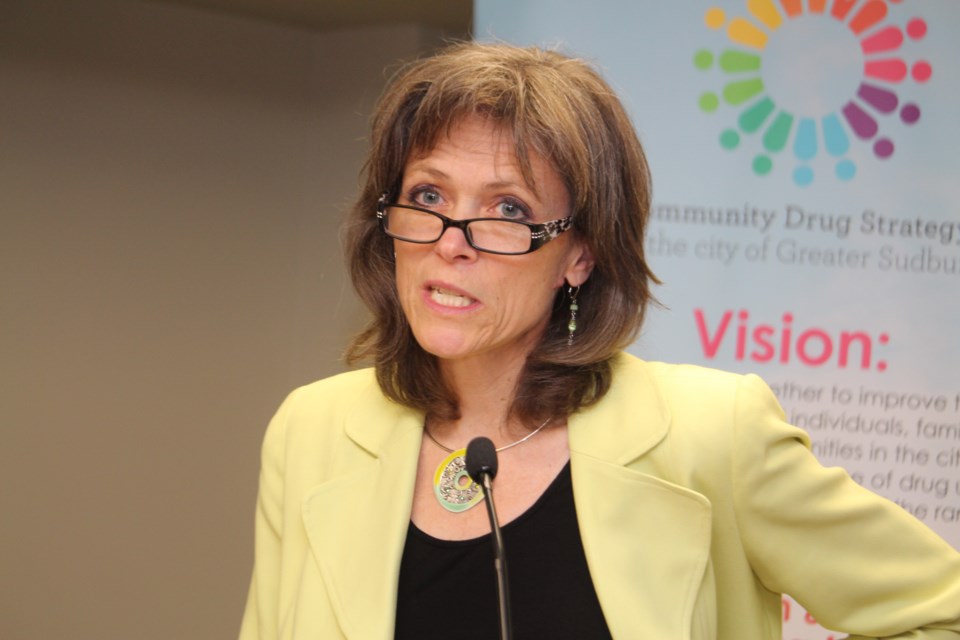There were few dry eyes among members of the management team at Public Health Sudbury & Districts when cuts to public health were announced in the spring budget of Progressive Conservative Premier Doug Ford’s government last week.
The damage was worse than medical officer of health Dr. Penny Sutcliffe and many of the unit’s 250 employees had feared. Sutcliffe will forever categorize life as before and after April 11, the day the budget was presented, because it will have such a significant impact on public health programs and services.
Sutcliffe was concerned about what even a five per cent decrease in provincial funding would mean for the unit that serves Greater Sudbury and the districts of Sudbury and Manitoulin. The cuts will be more in the order of four or five times that amount, said Sutcliffe, calling them her worst nightmare.
She and the senior team met to discuss how the $200 million the provincial Tories intend to cut from public health by 2021-2022 might hurt residents of the district and affect the staff complement at the health unit. While those cuts aren’t scheduled for a couple of years, Sutcliffe expects the health unit’s budget will be trimmed this fiscal year.
The board of Public Health Sudbury & Districts had been seeking a one-per-cent increase for this fiscal year, after years of flat-lined funding. Sutcliffe estimates when the massive cuts go into effect, they will amount to between 21 and 26 per cent of the $1 billion in public health funding allocated each year in Ontario. Sutcliffe said she never expected imagined the day when a zero per cent increase in funding would be desirable. “You know, give me zero.”
Public Health Sudbury & Districts does not know what changes are in store for it, but it has more to worry about than getting by with less money. The province is also paring down Ontario’s 35 public health units to 10. Sutcliffe points out these are not mergers of existing boards but rather the creation of new regional public health entities and regional boards of directors. “And we don’t know what those regions are.”
Public Health Sudbury and other units are “hungry for details” about what the decrease in funding will mean. Sutcliffe has read over and over again the two pages in the spring budget relating to public health, trying to figure out what they mean.
As the funding formula stands, the province provides up to 75 per cent of the money for public health, with municipalities contributing 25 per cent. In reality, the provincial share is often closer to 60 to 70 per cent, leaving municipalities to pick up a larger tab, said Sutcliffe.
Health unit managers and directors are working to understand and get information about the changes as quickly as they can. “There are a lot of unknowns right now,” she said.
She estimates that $200 million in cuts will result in as many as 2,000 people losing their jobs provincewide. That will leave health units to find ways to do their work differently so they can meet the needs of Ontarians with less money and fewer people.
She fears nervous employees may leave their jobs to “look for more firm ground under their feet. We’ve got a lot of good people here and I sure don’t want them to leave.”
Public health units in Ontario are responsible for helping to prevent chronic disease, ensuring food safety, preventing and controlling infectious diseases, providing immunizations, and focusing on substance abuse, injuries and school health.
Sutcliffe describes it as keeping Ontarians healthy with programs and services for everything from the individual level to speaking out about poverty and advocating for health equity.
And while it is important to have a robust public health system to prevent tragedies such as the Walkerton E. Coli outbreak of 2000 and outbreaks of SARS from 2002-2003, “we are thinking of the next generation” of Ontarians, said Sutcliffe.
“These investments are so critically important” to the end goal of keeping people healthy, out of hospital and contributing productively to the economy.
Ontarians should be careful not to only recognize the value of public health programs when they’re gone, realizing “that we’re the backbone of health in our community.”
It is difficult, “but we believe it the work that we do and the long game.”
That is why employees at Public Health Sudbury & Districts and other health units in Ontario will roll up their sleeves and rethink what they do and how they can do it with fewer resources.
For now, Public Health Sudbury needs to “grieve what we’ll be losing and then ... get on with creating the future,” said Sutcliffe. “People need us.”
In a statement released Tuesday, Sutcliffe said her unit is working with the four neighbouring public health units in the Northeast “to get ready for change.”
Public Health Sudbury has implemented an immediate hiring freeze and is cancelling all non-essential spending among other actions in response to provincial funding cuts.
Carol Mulligan is an award-winning reporter and one of Greater Sudbury’s most experienced journalists.
